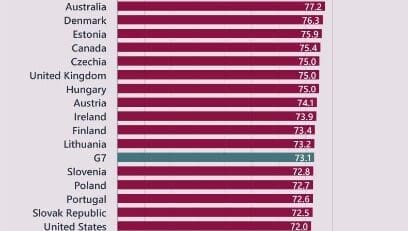Global VAT changes since July 2018
- Australia drops GST-free levy on small goods, and requires non-resident e-commerce companies to register if over the threshold of AU$ 75,000 per annum
- Bahamas raises VAT to 12%
- The introduction of Polish Split Payments
- Hungary introduces live VAT invoices reporting
- Aruba raises its Sales Tax
- Italy delays live invoice reporting for the fuel sector
- Russia lowers low-value consignment relief
- Colombia introduces VAT on e-services
From 1 July 2018, 10% GST is due on all goods sold by foreign online retailers to Australian consumers. Once the non-resident e-merchant sales more than AUS$75,000 per annum, they must GST register with the Australian authorities, file and pay any tax due. It is estimated that over 3,000 foreign companies will have to register for GST on goods.
Previously, there was a AUS$1,000 low-value consignment stock exemption from GST, which effectively meant only luxury goods retailers incurred any GST. The fines for non-compliance include a 75% administrative penalty. The Australian authorities will use a range of measures to track evasion, including tracking import information, reviewing sellers’ website and consumers’ foreign spend.
The GST reform was originally scheduled for July 2017, but resistance from the major online platforms resulted in a 1-year’s delay to 2018.
The Bahamas is to raise its Value Added Tax rate from 7% to 12% on 1 July 2018.
The country’s Minister for Finance, Peter Turnquest, announced the rise to help meet a projected budget deficit this year. Some basic foodstuffs will become zero-rated to help soften the effects of the rise.
VAT was introduced in the Bahamas in January 2015.
Poland is preparing to launch voluntary anti-fraud VAT split payments on 1 July 2018. This may be made mandatory from 2019 for certain industries.
Purchasers of taxable goods or services will be given the choice to split the VAT element and pay into a special VAT Bank Account (‘r-VAT Account’) of their customer. If they do, they will be released from the shared liability for any missing or under declared VAT for their supplier. The VAT Bank Account will be closely monitored by the Polish tax authorities, and may generally only be used to settle monthly/quarterly VAT liabilities.
Hungary has confirmed that live VAT invoice reporting is proceeding from 1 July 2018.
The requirements apply to invoices with VAT chargeable above HUF 100,000 (approx. €320) – meaning a net invoice value of HUF370 000 (approx. €1,195). The timing of reporting Has been tightened up since the last update, and the option to report within 24 hours of the issuance of any invoice has been withdrawn. Submissions should therefore be real-time. Fines for non-compliance may be as high as HUF500,000
The Hungarian tax office has issued details of the invoice schema for e-reporting, but the test site for software developers is still not live. The reporting requirements are provided in an XML data structure. Companies will have to map their existing data to the XML data maps. A report testing site, KOBAK, can be used to test the XML files uploads. The new live reporting will replace the existing domestic sales invoice filings; but the domestic purchase invoice reporting requirement will remain in place for the time being.
Aruba’s parliament has passed a rise in sales tax. The existing 1.5% business turnover tax will rise to 3%. The country’s health tax will rise from 2% to 3%, taking the total turnover tax burden 6%.
There will be a new crisis levy of 2.5%.
The new rates will apply from 1 July 2018, and are designed to reduce the government’s stubborn 3.9% deficit and debt burdens.
Italy has announced that it will delay the 1 July 2018 roll out of SdI live invoice reporting for fuel companies until 1 January 2019. This is the date planned for the implementation for all other companies.
The announcement was made by the Minister of Labour and Economic Development, Luigi Di Maio. The delay will be confirmed later in a decree. The postponement comes after threats of strikes in the industry, which is opposed to the implementation.
Sistema di Interscambio (SdI) is the VAT invoice reporting system which requires qualifying companies to submit in real time their invoices to the Italian Revenue Agency. The invoices are then past to the customer by the tax authorities. At present, only B2G (business to government) transactions are obliged to be submitted.
The Russian Ministry of Finance has proposed lowering the VAT-free threshold for goods imported into the country – ‘low value consignment relief’.
From 1 July 2018, the threshold will be cut from €1,000 to €500 per import. It will be further dropped to €200 on 1 January 2019.
Many other countries are reducing or scrapping VAT and Custom Duties thresholds on personal imports due to large-scale frauds. The EU is to scrap its threshold in the next two years.
Colombia has levied VAT on the provision of electronic services to its consumers by non-resident providers. The measure comes into effect on 1 July 2018.
DIAN (Dirección de Impuestos y Aduanas Nacionales), the national tax and customs authority requires foreign providers to VAT register to report income from digital services. Any service provided to a consumer has its tax residence, domicile, permanent establishment in the country.
This includes a simplified registration and filing process. Registration may be completed online to gain a unique TIN, tax identification number for the supplier. VAT returns are due bi-monthly.
vatlive.com




Leave a Reply
You must be logged in to post a comment.